Key takeaways:
- Understanding climate policy requires accessible language and emotional engagement to encourage public participation.
- Audio news aggregators enhance information consumption by providing diverse perspectives and engaging narratives that resonate emotionally.
- Effective media coverage is essential for public understanding, emphasizing the importance of clarity and expert insights in communication.
- Engaging with audio news communities fosters deeper exploration of climate topics and amplifies personal narratives, enriching discussions and advocacy.
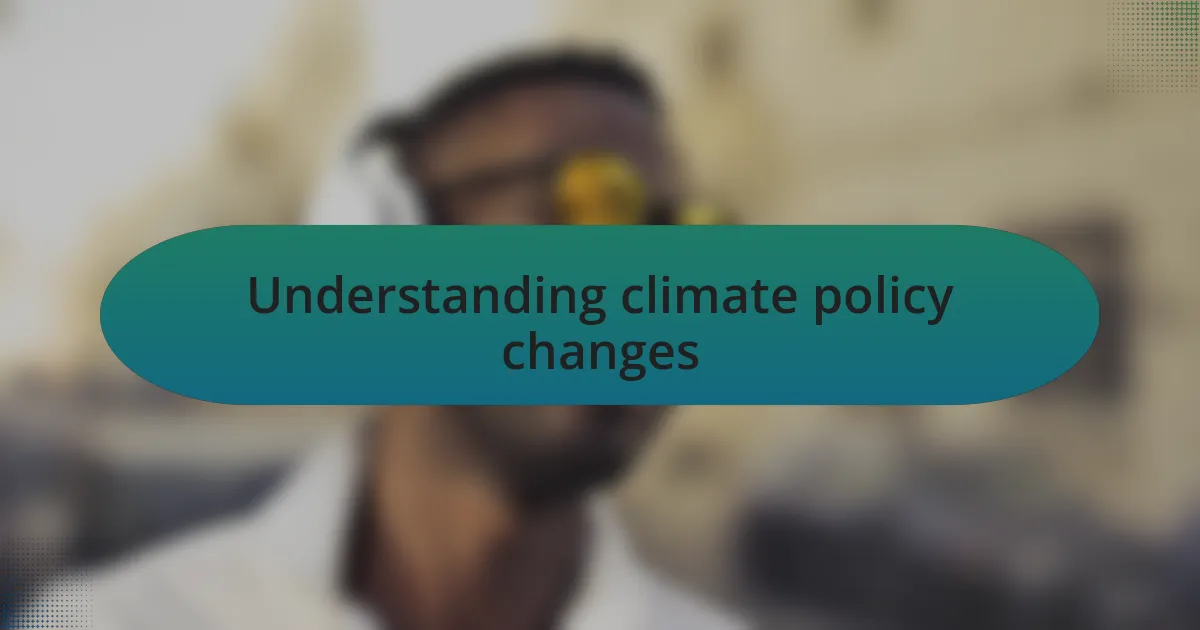
Understanding climate policy changes
Understanding climate policy changes can sometimes feel like navigating a complex maze. I remember when I first started delving into this topic; I felt overwhelmed by the jargon and the sheer volume of information. It made me wonder, how can we expect the average person to engage meaningfully with these changes if the language is so inaccessible?
As I explored further, I found that these policies often reflect a delicate balance between economic interests and environmental sustainability. I recall a conversation I had with a friend who was passionate about renewable energy; he opened my eyes to how policies can drive innovation or stifle it, depending on how they are structured. It’s intriguing to think about how a single policy shift can impact industries and communities.
The emotional weight of these changes is palpable, especially considering their long-term implications on future generations. It makes me ponder: what kind of world do we want to leave behind? These questions drive the urgency of understanding climate policies and encourage a deeper commitment to engaging with them.
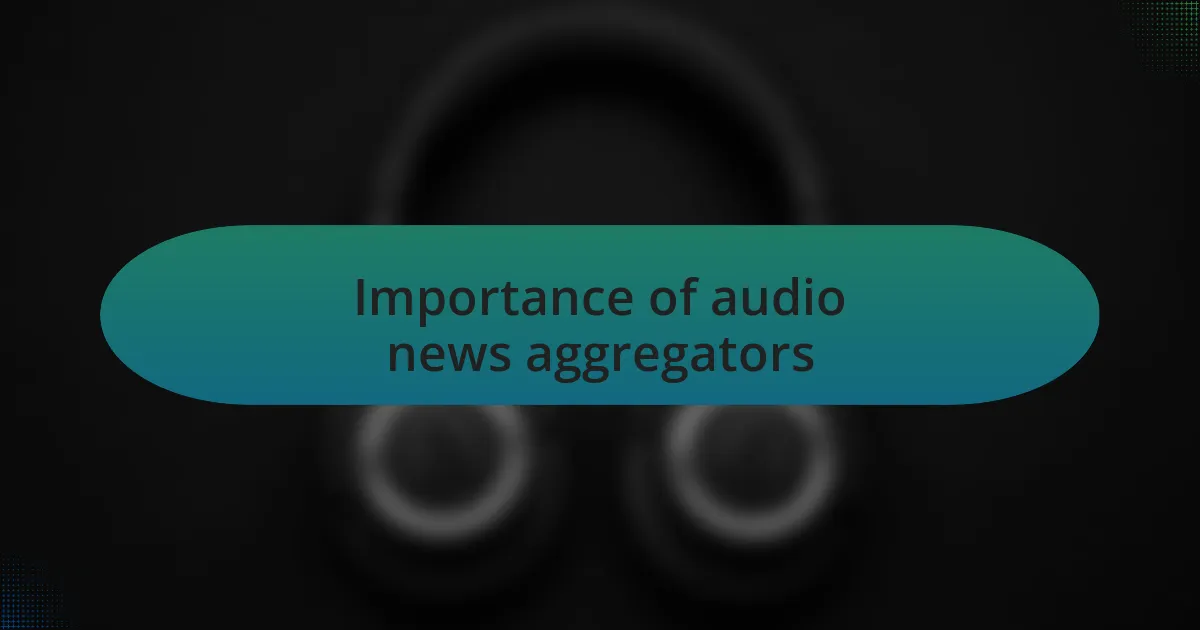
Importance of audio news aggregators
Audio news aggregators play a crucial role in how we consume information today. I recently realized that while I used to spend hours sifting through articles, now I can listen to multiple perspectives on climate policy changes during my commute. Isn’t it fascinating how technology transforms our habits and enables us to engage with important topics in a more accessible way?
The convenience of audio news means that busy individuals can stay informed without interrupting their routines. I often listen to audio briefings while cooking or exercising, and it’s refreshing to absorb critical updates in a format that feels more like a conversation than just another article. How has audio news transformed your experience of staying informed?
Moreover, these platforms often curate diverse voices and viewpoints, which is vital when discussing complex issues like climate policy. I can remember tuning into a podcast where experts from different fields debated the nuances of carbon taxes. It reminded me of the importance of hearing various opinions, as it enriches our understanding and enables us to form our own educated perspectives. Isn’t it empowering to take in a range of insights on topics that truly matter?
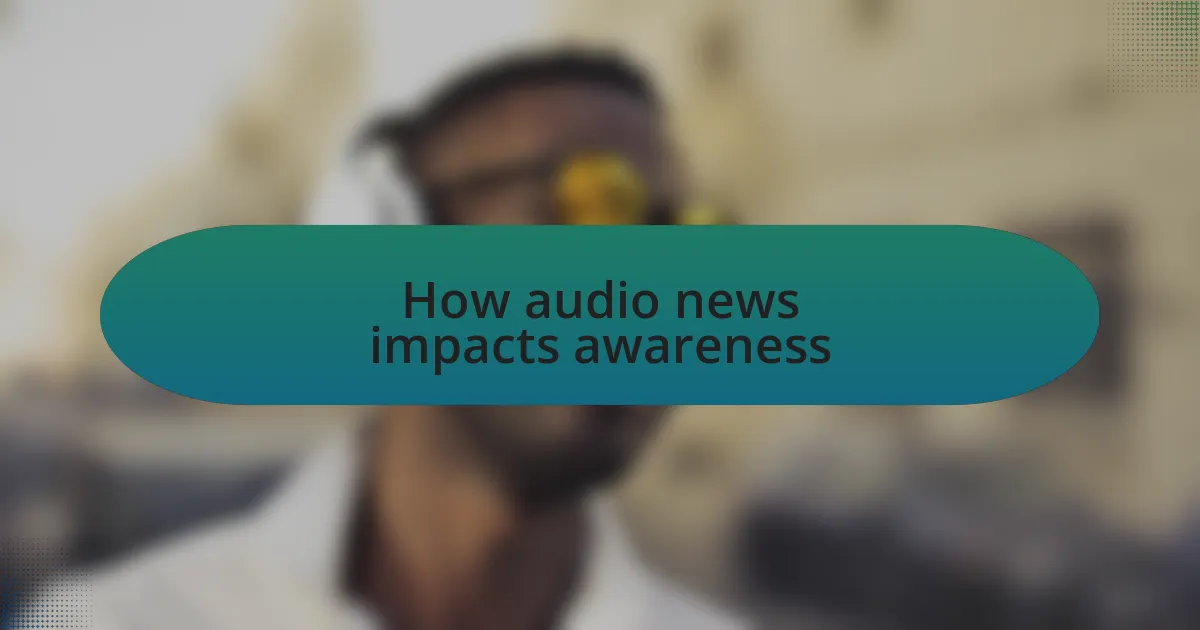
How audio news impacts awareness
Audio news has a remarkable way of enhancing awareness, particularly on intricate topics like climate policy. I recall a recent instance where I listened to an audio report during a long drive; the compelling narratives made the complex data about emissions policies come alive. Have you ever noticed how much easier it is to grasp such a multifaceted subject when it’s presented in an engaging, narrative format?
It’s not just about convenience; audio news stimulates our emotions and curiosity. Just last week, while preparing dinner, I tuned into a segment that highlighted the real-life experiences of families affected by climate change. Hearing their stories fostered a deeper emotional connection to the facts and figures I often read about dryly in articles. This personal touch ignites a sense of urgency in us, doesn’t it?
Moreover, regular exposure to varied audio news sources keeps our awareness sharp. I find myself revisiting thoughts sparked by a passionate commentator weeks later, which illustrates how these audio snippets linger in our minds. It makes me wonder: isn’t a well-placed podcast segment more memorable than a lengthy article? Engaging with audio news transforms knowledge into an ongoing conversation rather than a one-time reading experience.
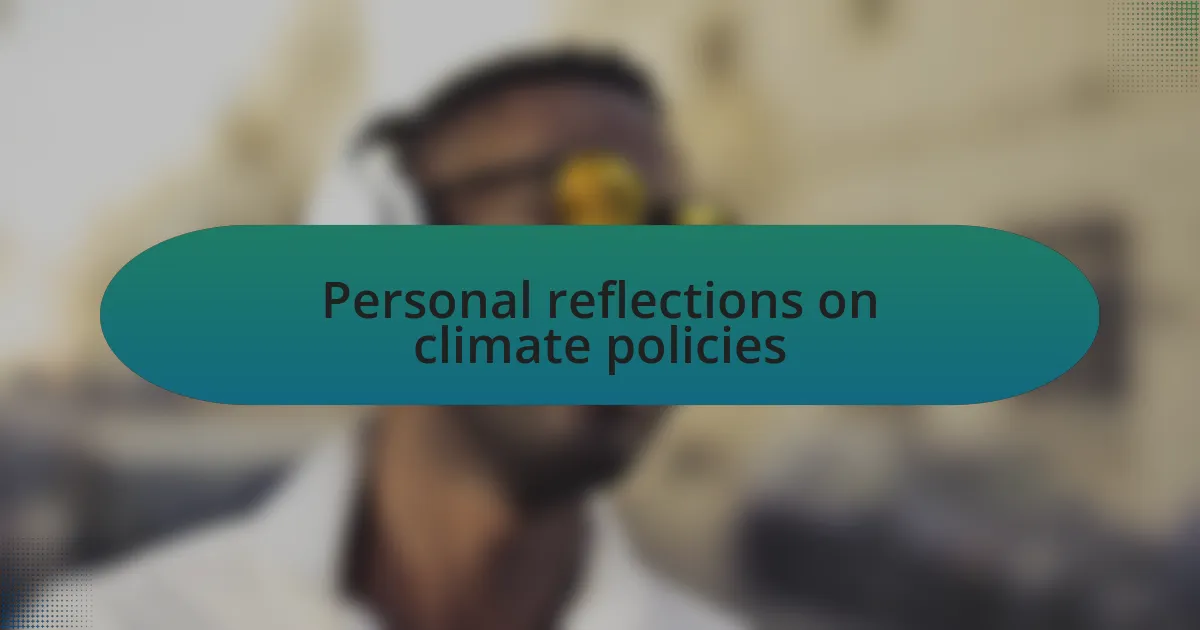
Personal reflections on climate policies
Listening to recent discussions on climate policies has shifted my perspective dramatically. I remember driving through a nature reserve, surrounded by thriving ecosystems while hearing a podcast detailing the devastating impacts of climate inaction. It struck me how the beauty around me is intertwined with the urgent need for effective policies; it almost felt like a wake-up call.
Engaging with climate policies on an emotional level has become increasingly important for me. One evening, I attended a local seminar where passionate speakers shared personal stories related to wildfires and flooding. Seeing their determination to advocate for change reminded me of my responsibility to contribute positively, and it made me wonder: how many of us truly understand the human face of these statistics we read about?
Sometimes, I catch myself reflecting on the small changes I can make in my life that align with sound climate policies. After listening to an inspiring discussion about sustainable practices, I decided to reduce plastic usage in my daily routine. It’s incredible how such conversations can spark personal action, leading me to think—are we all capable of igniting change through our individual choices?

Analyzing media coverage effectiveness
Analyzing how media coverage shapes public understanding of climate policy is crucial. I recall listening to a news segment where a respected journalist tackled the complexity of new regulations. The way they broke down technical jargon made the information accessible, and I found myself wondering: how many people might have a similar “aha” moment if all reports were presented that clearly?
Not all media coverage achieves this level of clarity. I experienced frustration while reading an article that glossed over essential details, leaving me confused about the proposed changes. When information is vague, I wonder if it fosters disengagement among readers, ultimately undermining the urgency of what needs to be addressed.
Interviews with experts can also enhance media coverage effectiveness. For instance, I once listened to a podcast featuring a climate scientist who explained key issues with incredible passion. Their ability to relate scientific findings to everyday life struck a chord with me, making the stakes surrounding climate policy feel more real and immediate. When experts share their insights in relatable ways, don’t you think it makes the issue resonate more profoundly with the audience?
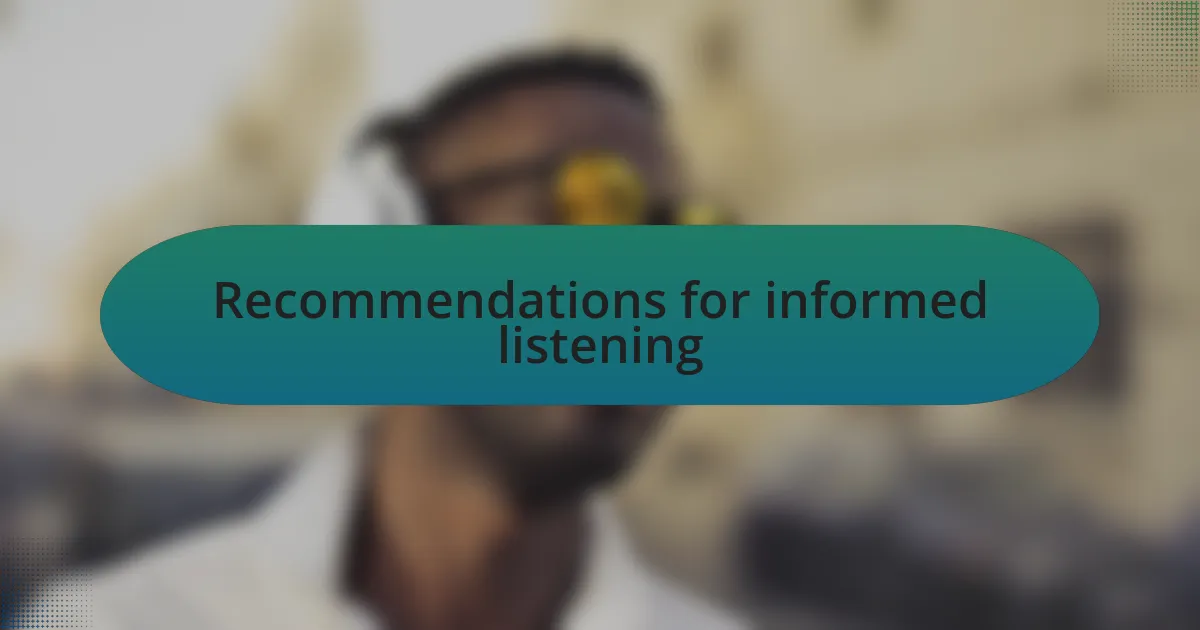
Recommendations for informed listening
To stay informed while listening to audio news, I recommend seeking out sources that prioritize clear and compassionate communication. I remember tuning into a discussion where the host went beyond the headlines to dive into the human stories behind climate policy changes. It made me realize how impactful personal narratives can be—do you ever feel more connected to a topic after hearing someone’s personal experience related to it?
Another important strategy is to cross-reference information from multiple platforms. Once, while listening to different podcasts about the same climate event, I noticed discrepancies in how key facts were presented. This experience highlighted for me the importance of looking for common threads and alerting myself to biases that can shape narratives. Has anyone else seen how varied perspectives can enrich understanding?
Lastly, consider the tone and urgency of the reporting. I once listened to a segment that conveyed the gravity of climate issues without overwhelming me. It was a balance that actually motivated me to learn more and take action. Isn’t it fascinating how the way information is presented can influence our response?
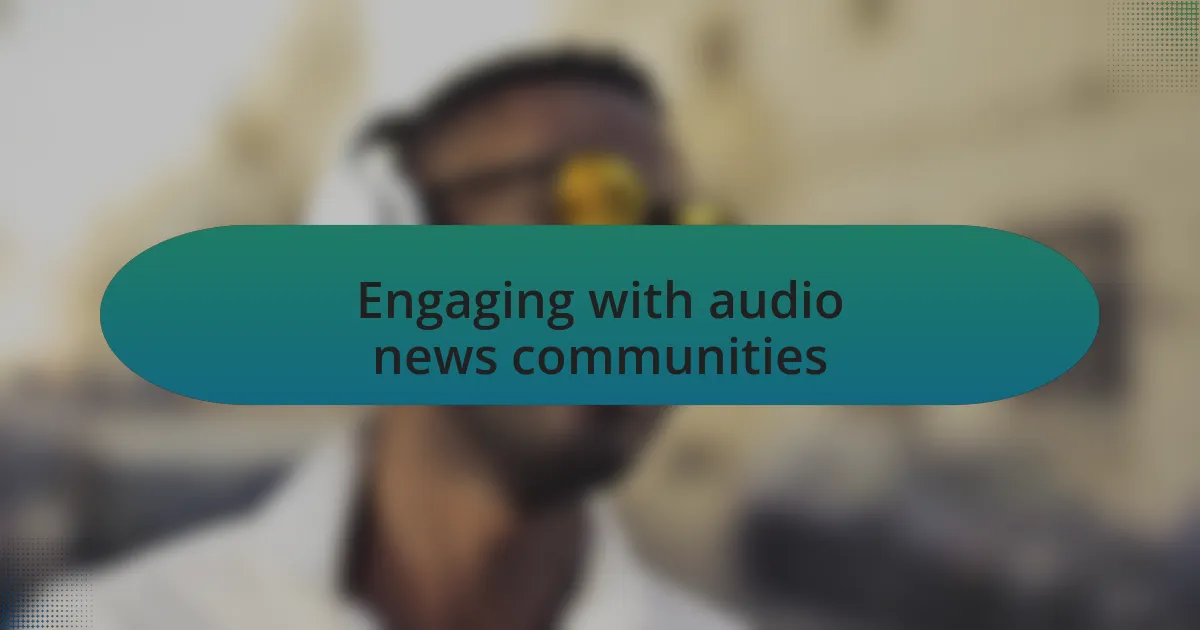
Engaging with audio news communities
Engaging with audio news communities can be a transformative experience for listeners. I recall joining a forum dedicated to environmental podcasts where I connected with others who shared my passion for climate issues. The discussions were not only insightful but also fostered a sense of belonging. Have you ever felt more inspired to engage in advocacy after sharing thoughts with like-minded individuals?
Participating in these communities encourages a deeper exploration of topics. For instance, some members initiated discussions around specific audio segments that covered climate policy impacts on local communities. Hearing diverse perspectives really opened my eyes; it made me appreciate how policies affect people differently. Isn’t it interesting how a single conversation can shift your understanding?
Moreover, I’ve seen how such communities can amplify important voices in the narrative. The sharing of personal anecdotes by fellow listeners often sparked discussions that I hadn’t considered before. I once shared a story about how my neighborhood is adapting to climate change, and it resonated with many. Isn’t it powerful to share and connect over our unique experiences?